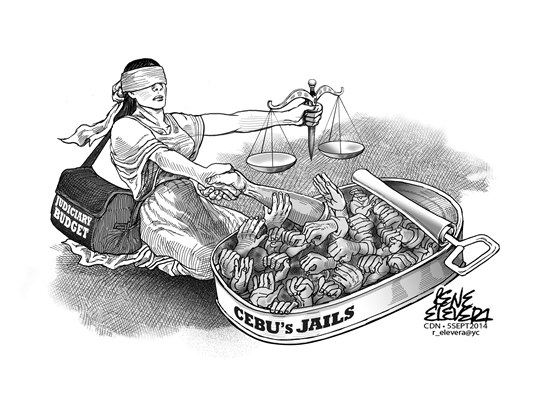While Supreme Court administrator Midas Marquez’s pronouncement that Cebu’s jails are overcrowded, a proposal by retired Regional Trial Court judge Meinrado Paredes to add more judges and courts to resolve the backlog of pending cases earned more than a mention in local news circles.
The numbers are depressing enough.
Mandaue City Jail, for one, is overcrowded by 1,500 percent with 1,020 inmates stuck inside a facility that can accommodate only 65 prisoners.
In Cebu City, the Operation Second Chance Center for youth offenders is about to lose its jail guards as the Bureau of Jail Management and Penology (BJMP) plans to pull them out due to budget constraints.
One explanation given is that more than half of the prisoners have pending cases and have to be detained so they won’t escape prosecution. But while they languish behind bars, the courts painfully plod through their cases while having to deal with other cases that eventually pile up due to a lot of reasons, not the least of which are the delaying tactics of enterprising lawyers.
Not a few of these prisoners likely deserve to be locked up because of their crimes and the danger they pose to the community at large, their crimes so heinous that it draws outrage and cast serious doubts at their humanity.
There may also be criminal suspects who are so poor they commit crimes to avail of “free board and lodging” in jail, though looking at their “accommodations” makes one wonder how anyone could live locked up in a place so filthy and foul-smelling that one could probably die of disease before he or she is convicted or acquitted.
Jail is certainly no vacation spot.
These inmates would probably think they’re in utopia when they do get detained in the same “cells” housing suspended Senators Juan Ponce Enrile, Bong Revilla and Congresswoman Gloria Macapagal Arroyo, though they probably won’t have cable TV or Internet access.
While building more detention facilities may temporarily solve the problem, long term solutions include faster prosecution of cases and a stronger law enforcement system in which a responsible, proactive police and other agencies serve as an effective deterrent against criminality.
For it is effective law enforcement, coupled with a positive support system consisting of the family, church and school that ultimately cures the menace of criminality.
There will be head cases but the number of criminals locked up will have gone down if both the national government and the community work together to achieve this balance.
We accept that this problem cannot be solved overnight so for starters, the executive department should allocate a bigger budget to the judiciary and they in turn should implement programs to ensure speedier and more effective resolution of pending cases.
